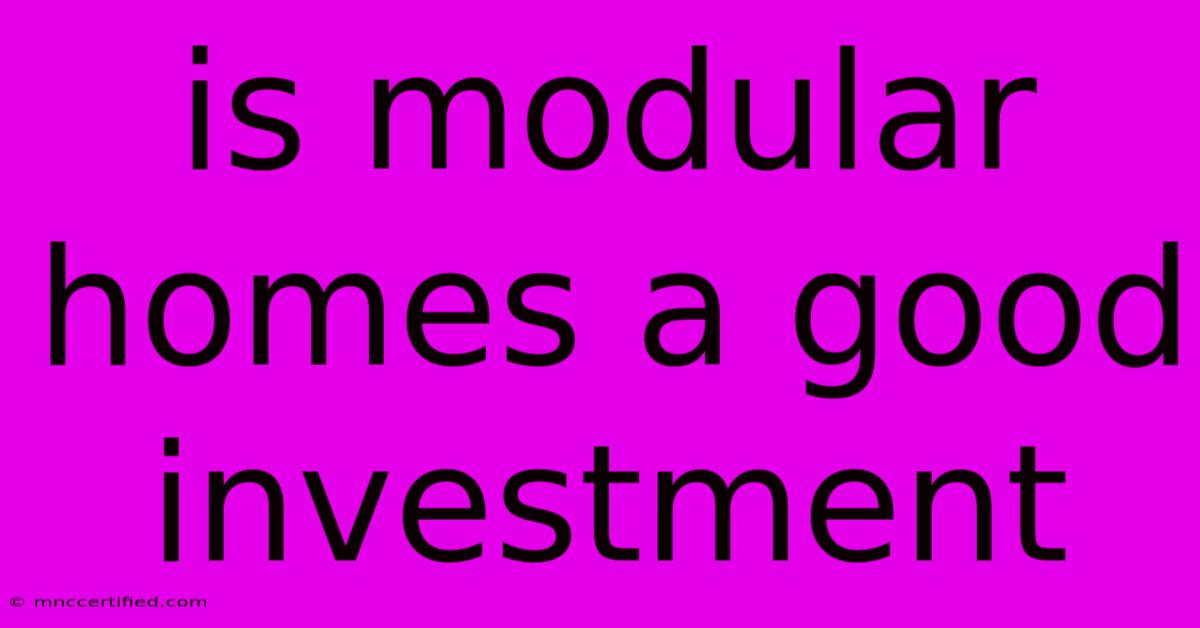Is Modular Homes A Good Investment

Table of Contents
Is Modular Home a Good Investment? A Comprehensive Guide
Are you considering a modular home? This comprehensive guide explores the advantages and disadvantages of modular homes as an investment, helping you determine if it's the right choice for you. We'll delve into factors like cost savings, resale value, and long-term financial implications to provide a well-rounded perspective.
Understanding Modular Homes: More Than Just "Prefab"
Before diving into the investment aspect, it's crucial to clarify what modular homes are. Often mistakenly categorized as "prefab," modular homes are built in climate-controlled factory settings, offering several key benefits over traditional site-built homes. These benefits extend beyond simply faster construction times; they impact the overall investment potential significantly.
Key Differences Between Modular and Traditional Homes
| Feature | Modular Home | Traditional Home |
|---|---|---|
| Construction | Factory-built, sections assembled on-site | Built entirely on-site |
| Speed | Significantly faster construction time | Longer construction timelines |
| Cost | Potentially lower material and labor costs | Typically higher construction costs |
| Quality Control | Consistent quality control in a controlled environment | Subject to weather delays and on-site variations |
| Customization | High degree of customization available | Customization options can be limited |
Is a Modular Home a Good Investment? Weighing the Pros and Cons
The question of whether a modular home is a good investment hinges on several crucial factors. Let's explore both sides of the coin:
Advantages of Modular Homes as an Investment
- Cost Savings: One of the most compelling arguments for modular homes is their cost-effectiveness. Factory production often leads to lower labor and material costs, potentially saving you thousands compared to traditional construction. This initial cost saving significantly boosts the return on investment (ROI).
- Faster Construction: Modular homes are built much faster than traditional homes. This translates to reduced interest payments during construction, potentially saving you considerable money over the long term. The shorter build time also allows you to move in and begin generating rental income (if investing in a rental property) sooner.
- Energy Efficiency: Modular homes are often built to higher energy efficiency standards, leading to lower utility bills and increased long-term savings. This enhanced energy performance also contributes positively to the property's value.
- Durability and Quality Control: The controlled factory environment ensures consistent quality, minimizing the risk of construction errors and defects common in on-site builds. This leads to a more durable structure with potentially lower maintenance costs over its lifespan.
Disadvantages of Modular Homes as an Investment
- Resale Value: While the resale value of modular homes is improving, some buyers still harbor misconceptions about their quality or longevity. Thorough research and strategic marketing are key to overcoming this potential obstacle.
- Financing: Securing financing for a modular home can sometimes be more challenging than for a traditionally built home, depending on the lender. Shop around for the best interest rates and terms.
- Land Costs: Remember that land acquisition costs are separate from the home's construction cost. Factor in land price and preparation costs when calculating the overall investment.
- Transportation and Site Preparation: Transporting the modular sections to the building site and preparing the foundation require careful planning and may add to the overall project cost.
Maximizing Your Return on Investment (ROI) with Modular Homes
To maximize your ROI, consider these strategies:
- Location, Location, Location: Choose a desirable location with strong property value appreciation potential. This is crucial, regardless of whether the home is modular or traditionally built.
- High-Quality Materials and Finishes: Invest in high-quality materials and finishes to increase the perceived value and desirability of your modular home.
- Customization: While cost-effective, avoid sacrificing customization entirely. Tailor your home to meet market demands in your area to increase appeal.
- Professional Marketing (If Selling): If planning to sell, use professional real estate agents who understand modular homes and can effectively market their unique selling points.
Conclusion: Is a Modular Home Right For You?
Whether a modular home is a good investment depends on your individual circumstances, financial goals, and market conditions. By carefully weighing the pros and cons, understanding the potential challenges, and implementing strategic planning, you can make an informed decision about whether this type of home aligns with your investment objectives. The potential for cost savings and faster construction makes modular homes a compelling option for many, but thorough research is crucial for a successful outcome.

Thank you for visiting our website wich cover about Is Modular Homes A Good Investment. We hope the information provided has been useful to you. Feel free to contact us if you have any questions or need further assistance. See you next time and dont miss to bookmark.
Featured Posts
-
Johnsons Five For Australia Wins Series
Nov 17, 2024
-
Tulane Football Aac Championship Berth
Nov 17, 2024
-
Independent Insurance Agents Of Ms
Nov 17, 2024
-
Leavitt Confirmed White House Press Secretary
Nov 17, 2024
-
London Weather 2 C Feels Like
Nov 17, 2024